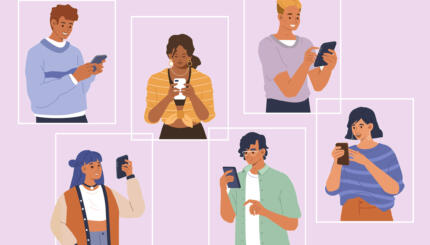Maybe you get sweaty palms and feel nauseous just thinking about giving a presentation in front of the class. Or maybe you avoid talking with your peers and skip family get-togethers because the whole thing paralyzes you with fear. If this sounds familiar, you may suffer from social anxiety disorder (SAD). More than just shyness in group situations, social anxiety disorder is an intense fear of being judged negatively, embarrassed, or rejected to the point of isolating yourself from other people. People experience SAD in many different ways. For instance, SAD can be debilitating for some people, while for others it is more of a persistent feeling of underlying discomfort. Either way, there are tools you can use to take control of SAD. Learn what causes this mental health condition, and how you can overcome it.
What It Is
Roughly 5.3 million people suffer from SAD, which can start between the ages of 11 and 19, and encompasses behaviors like not wanting to speak with peers or adults, avoiding class participation, never going to parties or hanging with friends, and feeling preoccupied with the fear of embarrassment. In extreme cases, someone with SAD may even refuse to go to school or other public places in order to avoid social interaction.
“If you have SAD, you often experience anxiety around giving a presentation in school, speaking in front of your class, or going on a date,” says Jessica Gulmi, LCSW, MA, the director of the youth and young adult clinic at the Jewish Board in New York City. Feeling nervous in those situations probably sounds pretty normal, but it’s the level of stress these moments cause that’s not normal. It becomes all you think about, and it gets harder and harder to focus on other parts of your life. When anxiety starts to affect performance at school, interest in extracurricular activities, or ability to make friends, it could be a sign of SAD.
Ways It Affects You
“Socially anxious teens often worry that others will think they are weak, stupid, crazy, boring or unlikeable,” says Misti Nicholson, PsyD, director at Austin Anxiety & OCD Specialists. Being the center of attention can be stressful, as are these other anxiety-inducing situations:
- Making “small talk”
- Maintaining a conversation
- Exiting conversations
- Ordering at a restaurant
- Making a purchase at a store
- Telling a story or talking about a personal experience
- Flirting or asking someone on a date
- Asking for help
- Reading aloud
- Urinating in public restrooms within hearing range of others
- Making social media posts
- Sending texts
You don’t need to have all of these symptoms of SAD to have the disorder, but if some of them sound familiar to your experience, it might be a good time to seek help (see below on how to get it).
Who Gets It
It’s not clear why some people develop social anxiety disorder. Experts say it can be genetic, meaning if someone in your family has it, you are more likely to have it, too. Another explanation: It may stem from a childhood experience where a person was ridiculed or deeply embarrassed and now that feeling carries over to all other social situations. It may even be related to how your family socializes. One thing is certain: If you have SAD, it’s not just about toughening up or not being a wimp. SAD is a clinical condition, not an emotional weakness.
Where to Find Help
The first and most difficult step for someone with SAD is to share how you’re feeling. After all, having the condition causes anxiety around both asking for help and talking about personal experiences. Consider opening up to your parents, older sibling, or best friend, since it’s likely these people cause you the least amount of anxiety. Tell them exactly what you’re struggling with and how you feel about it. “Sometimes you’re not quite sure what’s going on, but you know it doesn’t feel good and something is not right,” says Gulmi. If it’s a friend or sibling you’re concerned about, ask them if they struggle with feeling nervous or upset in social situations. They may be relieved that someone’s noticed.
Coping with SAD
One of the best ways to work through social anxiety is cognitive behavior therapy (CBT), a type of talk therapy that teaches the skills needed to handle yourself in social situations. It is often paired with exposure therapy. “Exposure therapy—proactively seeking out anxiety-provoking situations or activities—is an important component of CBT,” says Nicholson. Don’t worry, you won’t do this alone! With plenty of support from your therapist, you might make a list of scenarios to explore, such as greeting a peer in the school hallway, starting a conversation with a classmate on the bus, and attending a Passover Seder with your extended family. Before you try it for real, you and your therapist will talk through how things might go, and what to say or do in different situations.
“Baby steps are ok, too,” says Nekeshia Hammond, PsyD, at Hammond Psychology & Associates, P.A. in Brandon, Florida. “If going to a party is too daunting because there are so many people, consider going to a restaurant with a close friend or two.”
“Practicing social mishaps is another way to overcome social anxiety,” adds Nicholson. Examples include dropping a handful of change in the checkout line, making a Facebook post with an obvious grammatical error, or asking a stranger where the closest coffee shop is located while standing in front of a cafe. Realizing the outcome of these situations is far less embarrassing than you feared can help you feel less awkward in future tricky scenarios.
Another technique called progressive relaxation involves deliberately relaxing each muscle in your body, starting with your face working down to your toes. Do this during moments of anxiety at a party or school gathering to take your mind off the stressful situation.
Group therapy can also be beneficial because you’ll hear from other teens going through similar struggles. In severe cases, medication may help. Lastly, listening to music, drawing, and writing can all be useful ways of working through your fears. The bottom line: There are many different ways to find support, but sometimes calling on the help of a professional can be your best bet.
Social anxiety disorder can cause you to overestimate the likelihood of feeling fearful or uncomfortable while underestimating your ability to cope when something embarrassing does occur. Will you die if your friends sing “Happy Birthday?” Not even close. Will life go on if you fumble a speech in class? You bet. It takes work, but with time and help from mental health professionals, you can learn to overcome SAD.
Special thanks to our experts: Jessica Gulmi, LCSW, MA , director of The Jewish Board Youth and Young Adult Clinic; Misti Nicholson, PsyD, director of Austin Anxiety & OCD Specialists; Nekeshia Hammond, PsyD, Hammond Psychology & Associates, P.A.






